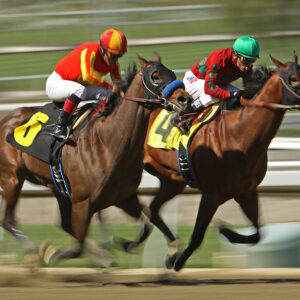For an opposing point of view see: “Counterpoint: Celebrate Derby Day!”
The first Saturday in May has been a day of mourning since 2008, when Eight Belles broke both front ankles after crossing the finish line in the Kentucky Derby. She was euthanized on the track.
America had fallen out of love with horse racing years before, but the sight of that lovely gray filly lying in the dirt just two years after the colt Barbaro shattered a leg at the Preakness Stakes was a blow upon a bruise. It was a catastrophic injury on network television, witnessed by millions.
This year, even before the starting bell rings, the body count has begun. Derby contender Wild On Ice was euthanized after fracturing a leg in training last week. Visitors to Churchill Downs brought flowers as a tribute to the gelding — and placed them on the statue of Barbaro.
But it’s also the racing industry that should be in mourning because its death seems imminent.
The staggering decline of horse racing in the United States points it toward oblivion. The betting handle (total amount bet) in the U.S. has been stagnant for three decades and, when adjusted for inflation, has fallen precipitously. In 2022, the number of thoroughbred foals was half what it was in 2005, the year Eight Belles was born. Dozens of tracks have shuttered, and for many of the ones that remain open, attendance is so sparse they resemble COVID safe zones, with 20 people at a track that used to bring out 20,000 bettors a night.
Many more would have closed long ago but for the injection of cash generated by the placement of slot machines or video lottery terminals in or near the tracks. In New York, for example, the 11 thoroughbred and standardbred tracks enjoy $230 million in video lottery terminal subsidies — and return just $10 million to the state in pari-mutuel wagering taxes. By contrast, betting on other sports brought New Yorkers $909 million in just its first year.
Many who will be gathering to drink mint juleps on May 6 couldn’t tell a furlong from a trifecta. When Triple Crown season is over, they won’t give another thought to horse racing until the following May. The Derby is an excellent excuse for a party, but it’s not an accurate measure of racing’s popularity. How many people have heard of Flightline, the 2022 Horse of the Year?
There may be several reasons for the decline, but chief among them is an American public that has grown intolerant of animal suffering in sport. It’s just not acceptable for a horse to die during what is supposed to be entertainment.
It’s noticeable to even casual fans that winning horses are retired to stud at the age of 3 or 4 — before they’re even physically mature — because the risk of life-ending injury is so great. Get them to the breeding shed fast before a broken leg eliminates years of stud fees. Flightline was retired to stud after just six races.
Horse racing is now all about racing to breed rather than breeding to race.
Many in the industry just don’t get it. Over and over they say, “We need to improve our public image.” Or, “If PETA would go away everything would be fine.”
PETA’s not going away. More important, as I told the Kentucky Horse Racing Commission at a public hearing more than a decade ago, racing doesn’t have an image problem — it has a reality problem. Three horses die on U.S. tracks every day. Racing has become synonymous with drugs, death and misery. Not because PETA’s investigations have revealed doping, slaughter and horses raced with fractures, but because it’s accurate.
Some in the industry have acknowledged this and tried to make changes. The Jockey Club released a progressive list of recommendations. California passed groundbreaking new regulations to protect horses. Long-awaited legislation brought a federal oversight body for the first time ever. Yet, others in racing have fought every action that could prevent death, including a switch to synthetic tracks, which the industry’s own statistics have shown to be the safest surface by far.
While California has reduced the number of races and the deaths, in some other states there’s not even a requirement to have a veterinarian present. PETA found a West Virginia track was dumping the bodies of horses killed on the track in a local landfill.
Unless the entire industry accepts the reality and fixes it, the Derby celebration will become the party your grandparents had.

